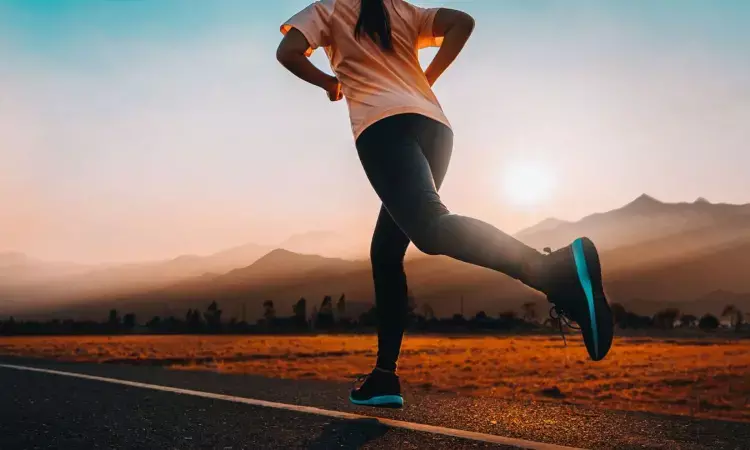- Home
- Medical news & Guidelines
- Anesthesiology
- Cardiology and CTVS
- Critical Care
- Dentistry
- Dermatology
- Diabetes and Endocrinology
- ENT
- Gastroenterology
- Medicine
- Nephrology
- Neurology
- Obstretics-Gynaecology
- Oncology
- Ophthalmology
- Orthopaedics
- Pediatrics-Neonatology
- Psychiatry
- Pulmonology
- Radiology
- Surgery
- Urology
- Laboratory Medicine
- Diet
- Nursing
- Paramedical
- Physiotherapy
- Health news
- Fact Check
- Bone Health Fact Check
- Brain Health Fact Check
- Cancer Related Fact Check
- Child Care Fact Check
- Dental and oral health fact check
- Diabetes and metabolic health fact check
- Diet and Nutrition Fact Check
- Eye and ENT Care Fact Check
- Fitness fact check
- Gut health fact check
- Heart health fact check
- Kidney health fact check
- Medical education fact check
- Men's health fact check
- Respiratory fact check
- Skin and hair care fact check
- Vaccine and Immunization fact check
- Women's health fact check
- AYUSH
- State News
- Andaman and Nicobar Islands
- Andhra Pradesh
- Arunachal Pradesh
- Assam
- Bihar
- Chandigarh
- Chattisgarh
- Dadra and Nagar Haveli
- Daman and Diu
- Delhi
- Goa
- Gujarat
- Haryana
- Himachal Pradesh
- Jammu & Kashmir
- Jharkhand
- Karnataka
- Kerala
- Ladakh
- Lakshadweep
- Madhya Pradesh
- Maharashtra
- Manipur
- Meghalaya
- Mizoram
- Nagaland
- Odisha
- Puducherry
- Punjab
- Rajasthan
- Sikkim
- Tamil Nadu
- Telangana
- Tripura
- Uttar Pradesh
- Uttrakhand
- West Bengal
- Medical Education
- Industry
Inactivity pandemic may"undo" advances made in primary and secondary prevention of CVD

Spain: Regular physical activity (PA) and exercise are essential in reducing the risk of chronic ailments. A recent review in the European Heart Journal has stated that a pandemic of physical inactivity appears to parallel the widespread prevalence of CVD (cardiovascular disease), undoing many of the gains made in the fight against CVD.
In the review, Pedro L Valenzuela, University of Alcala, Madrid, Spain, and colleagues discuss some of the primary cardiovascular effects of physical activity/exercise, including a healthier metabolic milieu with attenuation of systemic chronic inflammation and adaptations at the heart tissue (myocardial regeneration and cardioprotective) and vascular (antiatherogenic effects) levels.
The authors have also summarized the current evidence for safe exercise and physical activity implementation in patients with cardiovascular disease.
Dr Valenzuela and the team have discussed myriad ways physical activity improves cardiovascular health for primary and secondary prevention. These include reduced inflammation, improved glucose control, and improved cellular integrity. In addition, there are improvements in endothelial function, endothelial cell integrity, and antiatherogenic and structural adaptations at the vascular level.
Also, there is preclinical evidence of myocardial regeneration, with data demonstrating that exercise following myocardial infarction can enhance perfusion, angiogenesis, and left ventricular function. The benefits go beyond moderating traditional risk factors; the reviewers say, "partly owing to the release of exercise-derived factors or exerkines. These are a broad array of signalling molecules that affect different organ systems, including the cardiovascular system. Additionally, exercise can also promote cardioprotective preconditioning and protect against malignant arrhythmias.
In their review, Valenzuela and colleagues say there is some debate around whether some people can exercise too much, specifically those who engage in strenuous aerobic sports like long-distance cycling events or marathon running.
Despite some concerns, no evidence links participation to a higher cardiovascular (CV) mortality risk. "There are consistent results for the opposite trend," they write. Data have also indicated large amounts of physical activity and exercise might be associated with higher coronary artery calcium scores and atrial fibrillation. However, according to the reviewers, the clinical implications of these findings are still being studied.
The reviewers summarize regular physical activity and exercise can induce significant beneficial effects concerning primary and secondary CVD prevention. Also, the benefits of an active lifestyle are fundamentally dose-dependent (with some evidence for PA benefits even above current WHO recommendations).
They noted that various biological mechanisms support exercise-induced CV benefits involving the heart tissue and the inflammatory and metabolic milieu. "Indeed, the recognition of the multisystem benefits of exercise can help to create a more holistic perspective in cardiovascular research as well as in patient care," the team concluded.
Reference:
Pedro L Valenzuela, Luis M Ruilope, Alejandro Santos-Lozano, Matthias Wilhelm, Nicolle Kränkel, Carmen Fiuza-Luces, Alejandro Lucia, Exercise benefits in cardiovascular diseases: from mechanisms to clinical implementation, European Heart Journal, 2023;, ehad170, https://doi.org/10.1093/eurheartj/ehad170
Dr Kamal Kant Kohli-MBBS, DTCD- a chest specialist with more than 30 years of practice and a flair for writing clinical articles, Dr Kamal Kant Kohli joined Medical Dialogues as a Chief Editor of Medical News. Besides writing articles, as an editor, he proofreads and verifies all the medical content published on Medical Dialogues including those coming from journals, studies,medical conferences,guidelines etc. Email: drkohli@medicaldialogues.in. Contact no. 011-43720751


